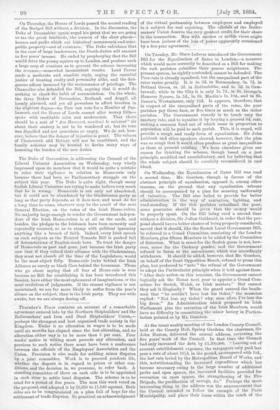On Thursday, the House of Lords passed the second reading
of the Budget Bill without a division. In the discussion, the Duke of Devonshire again urged his point that we are going to tax the great landlords, the owners of the show places— houses and parks which are historical monuments and semi- public property—out of existence. The Duke calculates that in the case of large landowners, the Death-duties will amount to five years' income. He ended by prophesying that the Bill would drive the young squires up to London, and produce such a large crop of evasions as to prevent the scheme increasing the revenue,—somewhat inconsistent results. Lord Ferrer made a moderate and sensible reply, urging the essential justice of treating realty and personalty alike, and the dan- gerous odium incurred by the maintenance of privilege. The Chancellor also defended the Bill, arguing that it would do nothing to check the habit of accumulation. On the whole, the three Dukes of Devonshire, Rutland, and Argyll, all keenly alarmed, and yet all powerless to affect taxation in the slightest degree—no Peer can vote for a Member of Par- liament, and the House of Lords cannot alter money Bills— spoke with creditable calm and moderation. That there should be a sort of "Ave Harcourt, morituri to acclutant" air about their oratory is not to be wondered at; but its tone was dignified and not querulous or angry. We do not, how- ever, believe that the danger of injustice is great. The valuers of Chatsworth aild Belvoir will not be exorbitant, and the family solicitor may be trusted to devise many ways of lessening the burden of the new duties.


































 Previous page
Previous page